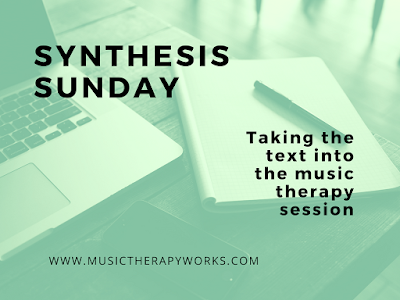Synthesis Sunday: With Rigour and Imagination and Mercedes Pavlicevic
Chapter four of Music Therapy in Context: Music, Meaning and Relationship by Mercedes Pavlicevic is my focus for this Sunday's post. The chapter is titled, "With rigour and imagination: Music therapy and music psychology." (p. 48-54)
This short chapter discusses the way we think about music within the worlds of scientific inquiry and art appreciation. There is a brief history lesson about why we think the way we think about art and science, and some discussion about what this means to music therapy and music psychology. The next several chapters promise to delve into music psychology more deeply, but this chapter did a good job of priming my thoughts about this topic.
Right off the bat, I had to use my dictionary to find out the difference between the words, "nomothetic" and "idiographic." I love when reading leads me into new vocabulary. According to Pavlicevic, "nomothetic" means finding a "more general and abstract drawing up of 'rules' that might be said to be true for all people" (p. 48). "Idiographic," on the other hand, "offers richly textured details of unique events" (p. 48).
In my experience as a music therapist, I have always wanted a nomothetic explanation of music therapy - something to say that covers all eventualities of music therapy - but I have often been relegated to offering idiographic examples about specific situations to demonstrate what I know to be true about music and music therapy.
This chapter speaks about the significant changes in Western Civilization during the Renaissance where humans stopped thinking about life in a mystical manner and became a bit more pragmatic and scientific in thought. Humans strove to find a model to explain every thing that we see and experience. Descartes, Bacon, Galileo Galilei, and Newton were some of the thinkers who assisted us from shifting our thinking into a more scientific model.
One of the issues about using a scientific model to explain everything is that music becomes something to quantify and qualify rather than to experience.
Pavlicevic asks:
"Is 'art' mutually exclusive of 'science?' - p. 52I wonder.
Should art be mutually exclusive of science? Can it be?
There is a push towards arts-based research these days. I've been interested in reading the research, but I don't know how it is working. It seems like we want to get back to a place of philosophical inquiry where we don't have to justify our profession with numbers, but I'm not sure that arts-based research is going to do it. I'm not sure that using idiographic experiences or examples is going to lead the world into a nomothetic awareness of music therapy.
Chapter four left me thinking a bit more deeply about why music therapy doesn't really fit in either world - the scientific world and the art world. I am looking forward to Chapter Five.
Thank you, Mercedes Pavlicevic, for this thought-provoking book. I am enjoying the journey.
Happy Sunday, all!
Pavlicevic, M. (1997). Music therapy in context: Music, meaning and relationship. London: Jessica Kingsley.


Comments
Post a Comment